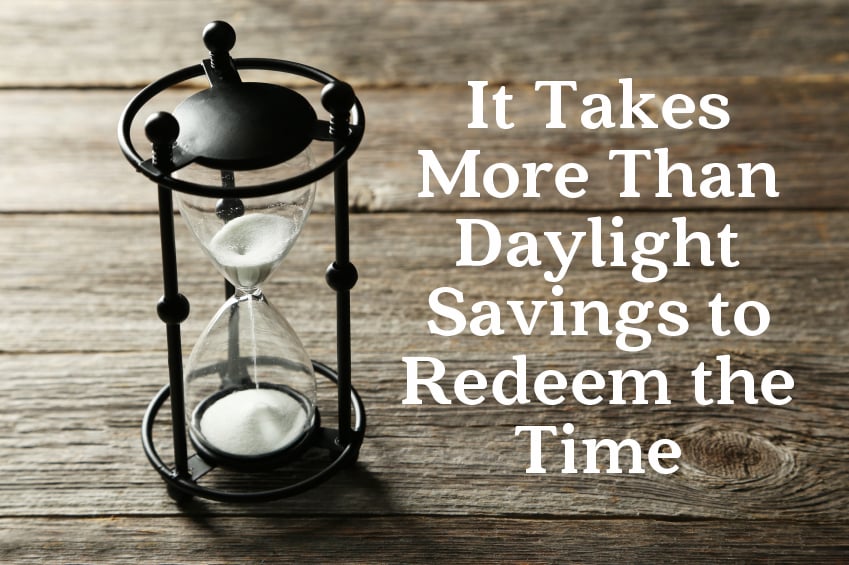It Takes More Than Daylight Savings to Redeem the Time
With Daylight Savings Time right around the corner, it’s worth reflecting on just what Paul meant when he wrote that we ought to be “redeeming the time.”

Paul’s warning to the church in Ephesus is a gloomy one. It weighs heavy on my mind whenever I’m brave enough to poke my head out the window and take a good, hard look at the world around me, because that’s all I can see: evil days.
Is there still good out there? Of course there is. There are kind, thoughtful people who do kind and thoughtful things—but they’re not always easy to find. Usually they’re buried underneath an avalanche of stories about wars and genocides, murders and shootings, swindling and corruption, and just a general parade of the very worst of human nature.
Evil days, without a doubt. But Paul’s warning wasn’t intended to be quite so depressing. In fact, taken in context, it can actually be encouraging. Here’s the full sentence:
“See then that you walk circumspectly, not as fools but as wise, redeeming the time, because the days are evil” (Ephesians 5:15-16).
Spring ahead, fall back
This coming Sunday marks every American’s least favorite part of Daylight Savings Time—waking up and discovering we were robbed of an entire hour of sleep, and then spending the remainder of the week trying to convince ourselves that 7 o’clock is the new 6 o’clock.
Daylight Savings fascinates me. It makes the universal constant of time feel completely arbitrary, as if resetting clocks across the nation grants us the power to bend the arrow of time itself.
That’s not the way it works, of course. We set the clocks forward in the spring, but we can’t just keep pretending to fast-forward through time. The clocks go back an hour in the fall because we understand that Daylight Savings has no impact on the actual flow of time. Turning our clocks forward or backward doesn’t stop time from marching forward, completely indifferent to us and our customs.
So how on earth are we supposed to redeem it?
The only thing we can really do with the past is learn from it, but the future is wide open.
Buying back the past?
The word redeem typically means “buying back”—that is, paying a price in order to recover something that once belonged to you. In that context, Paul’s instruction to redeem the time makes little sense. There’s no way to recover spent time—what’s gone is gone, and no amount of wishing or Daylight Savings can return it.
Thayer’s Greek Lexicon sheds some light on the matter, explaining that “the meaning seems to be to make a wise and sacred use of every opportunity for doing good, so that zeal and well-doing are as it were the purchase-money by which we make the time our own.” In other words, redeeming the time isn’t about buying back wasted time—it’s about dedicating ourselves to using future time wisely.
The context of the verse certainly seems to bear that thought out. In the chapter, Paul encourages the Ephesians to “walk in love,” to “walk as children of light” and to “walk circumspectly” (Ephesians 5:2, 8, 15). Again and again, Paul uses the imagery of movement, reminding us that redeeming the time is something we can only do by moving forward.
Forward motion
And that’s the key. That’s what’s so encouraging about this verse. It’s not about bemoaning the evil days around us or the wasted time behind us. Redeeming the time starts right now, in this moment, and extends to the moment after and the moment after that. The only thing we can really do with the past is learn from it, but the future is wide open. Ready to be redeemed. Ready for someone willing to walk in love, light and wisdom. Ready for you to use the time to fulfill God’s purpose in your life.
How to become that person is a much bigger topic—the kind we could spend all day talking about and only just scratch the surface. But the message of hope we can draw from Ephesians 5 is this: You can redeem the time, and you can start now. Even if up until this moment you’ve walked in hate, darkness or foolishness, it doesn’t have to stay that way. You don’t have to keep walking down that road.
God has something so much better waiting for you.
If you’re ready for a better path, then be sure to read Change Your Life, our free booklet written for all those in search of a better way to live.
Date Posted: March 11, 2017

 by Jeremy Lallier
by Jeremy Lallier

